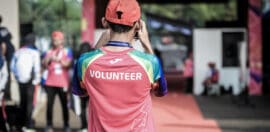The culturally diverse deficit in our emergency services

30 September 2021 at 8:38 am
New research finds many culturally diverse people face barriers to becoming an emergency services volunteer, but encouraging more diversity comes with a lot of benefits
When Zulfi came to Australia from war-torn Afghanistan, he was determined to give something back to the country that had taken him in.
Since joining the Greater Dandenong State Emergency Services (SES) unit, Zulfi has been involved in emergencies from road accidents, to fighting bushfires and missing person searches. These are experiences that stay with him.
“I’ve done a lot of missing person searches. Sometimes the outcomes are not so great but when you get a good outcome it’s fantastic,” he said.
“In those times I feel like I’ve done something for the country. I’ve helped someone from here.”
But the road to becoming an emergency service volunteer wasn’t an easy one. Zulfi found it difficult to apply because of the language used on the application form. Luckily, his unit helped out.
“They broke down the process into smaller segments,” he said.
Not everyone is as fortunate as Zulfi. New research from the Scanlon Institute has found that many culturally diverse people face significant barriers to becoming emergency service volunteers, such as not understanding where or how to apply, and difficulties understanding language on applications.
This issue is becoming more pressing as Australia’s volunteer workforce is shrinking.
In Australia, emergency service organisations consist of fire and ambulance services, state emergency services, marine rescue, the coast guard and lifesaving organisations. These organisations are predominantly volunteer-based, supported by only a small number of career or paid staff.
Able-bodied, Anglo-Celtic, hetrosexual men still dominate volunteer emergency service roles
The essay found that traditionally, emergency volunteer roles were dominated by able-bodied, Anglo-Celtic, hetrosexual men, with little representation from Indigenous, culturally diverse or LGBTI groups.
With a steady decline in the number of people volunteering due to time pressures on families and work commitments, it noted that these organisations were realising that to remain viable and to operate effectively in their communities, they needed to attract and retain a more diversified volunteer pool.
There are also other benefits to having more diversity in the emergency services.
Trisha Prentice, the author of the new research, told Pro Bono News, that making volunteering more accessible to people of diverse backgrounds would mean reaching more people, and delivering better services.
“What we found is that if a volunteer can speak the same language as someone, or is of the same background, that person in an emergency situation is more likely to trust the volunteer,” she said.
“There’s also the issue that some people in the community come from countries where those who wear uniforms are frightening and are not to be trusted.
“But to see someone who looks like them wearing the uniform and perhaps speaking their language is a great way of breaking down that fear.”
Prentice added that the benefits went beyond inclusion.
“It makes a difference to the outcomes of the organisation because new perspectives and world views are being shared that perhaps hadn’t been thought of before,” she said.
“It makes the organisation stronger.”
She said that it was important to note that most of the barriers to becoming a volunteer existed at the recruitment stage. Once volunteers were inside, they felt accepted and included.
This was the case for Jing, a Chinese international student who wanted to volunteer with St John Ambulance.
Armed with a background in medicine, she wanted to volunteer to practise her medical skills, gain new experience and meet new people. But when she first applied to St John in 2017, she wasn’t accepted.
“There was a group interview. My English wasn’t good and I didn’t talk much. So I failed the interview. I was a foreigner and it was my first time doing a group interview. I didn’t know how to perform,” Jing said.
Fortunately she persevered, and a year later she was accepted as a volunteer.
“I am now learning to work with different people from different backgrounds. I am also learning how to do assessments in an emergency situation, who to contact, how to communicate and how to prioritise tasks,” she said.
If there’s a will there’s a way
The research found that although increasing the number of culturally diverse volunteers was something a lot of organisations wanted, they were often constrained by a lack of resources.
But Prentice said that even with a small budget, it was possible to make connections with a cross-section of the community.
For example, if there were already culturally diverse volunteers in the organisation, they could help expand connections they already had in their communities.
“They all have family members, they all have friends, they all might be either studying or working, they might belong to a faith organisation.”
This is the approach that the SES unit where Zulfi volunteers has taken. Existing volunteers reach out to other members of their communities, in their own language, to encourage them to join the SES. Zulfi said that people in the Afghan community valued this approach.
“When we are speaking in their language, they ask, ‘How did you get into that? What do you do?’ They are interested in how I am giving back to the community,” Zulfi said.
He said that this approach created trust.
“If they see someone like me, they see an idol, they want to be like me,” he said.







